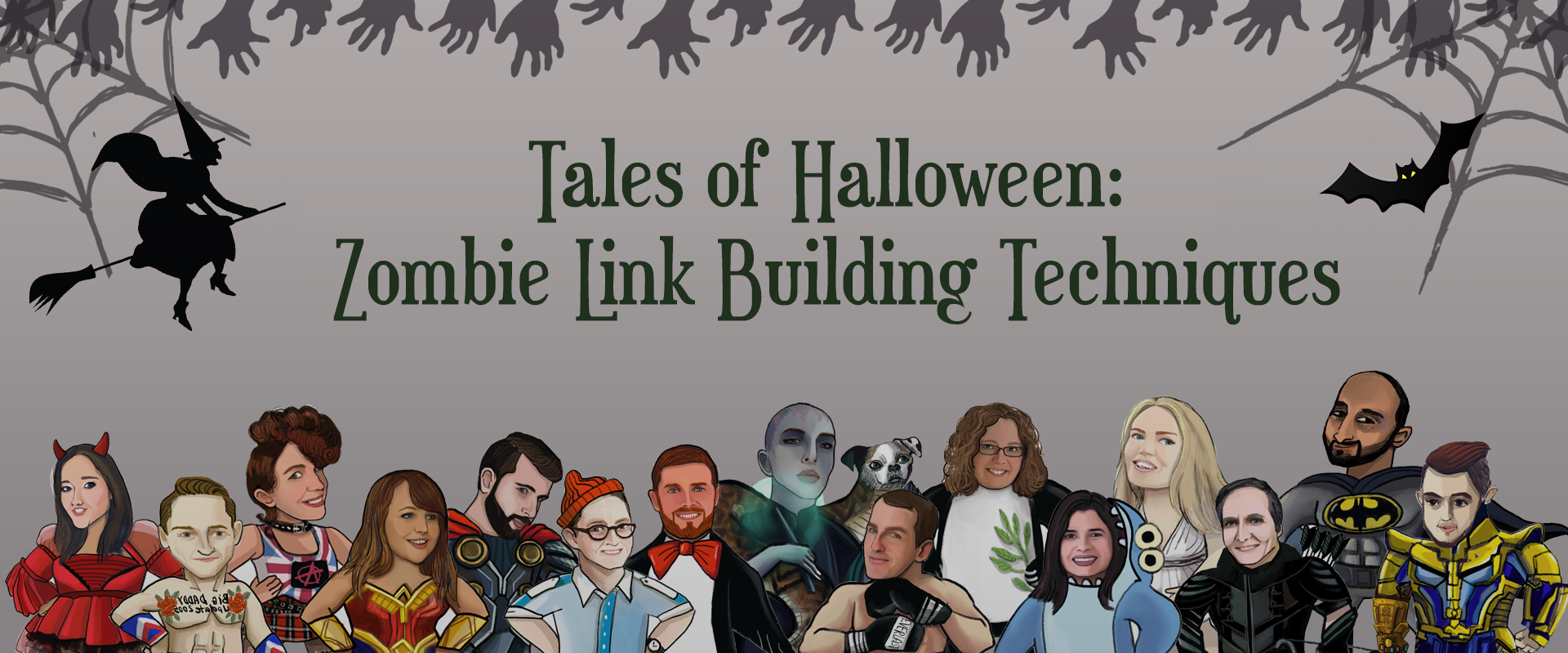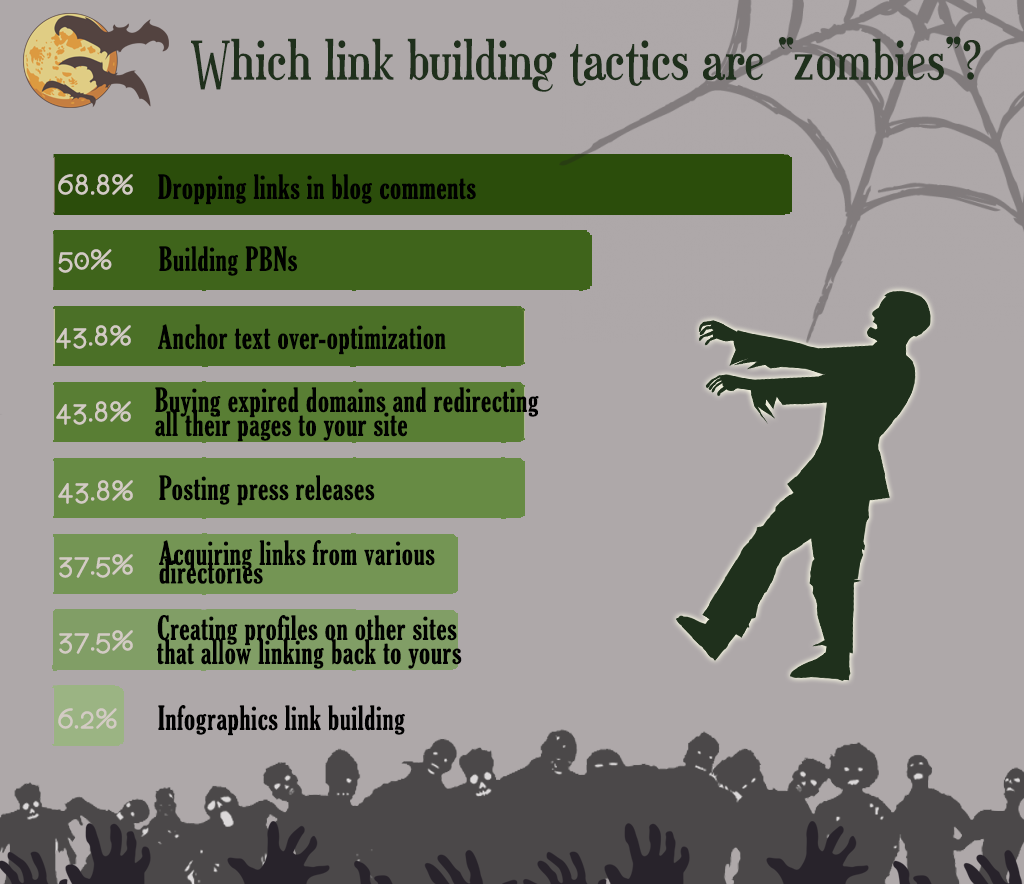Tales of Halloween: Zombie Link Building Techniques
Halloween is upon us. As night falls, spooky stories are brought back to life. We all know the old tale that if someone wants to keep a secret from being revealed, they should bury it where no one will find it, on page 2 of the SERPs.
In the spirit of Halloween, we decided to do some digging and it turned out that no one has ever heard a story about zombie link building techniques. So we thought that we’d give it a try.
It was a cold and gloomy evening. The trees were stripped bare of their glorious crowns, the rain kept pouring down, and the lightning cracked ominously. Yet, something gleamed in the distance: a solitary desk lamp in a dark office of a deserted high-rise was still on. Late at night, an SEO specialist named Gerbert had been desperately searching for a magic formula that would help him build links… loads of links.
Gerbert sifted through countless articles one after another, but nothing caught his attention. He was obsessed with the idea of discovering a silver bullet, something that would give him straightforward, step-by-step instructions on how to acquire links without having to put in the work. Each article he read fell short of this magical promise, and just when he started to despair, a cheerful alert on his laptop broke the silence… “You have mail. ” It was the All-Mighty Linkbuilder, who promised to share with him the secret ancient recipe for link building success. There was one condition. Gerbert had to purchase his link building course immediately. He was ready to do whatever it takes and quickly paid the $1000 subscription fee plus half his soul – the half that had truly mattered. In turn, he received three “magical” strategies and lengthy instruction for each of them:
- Dropping links in blog comments
- Building PBNs
- Buying expired domains and redirecting all their pages to your client’s site
In the course of the following days, he tirelessly built PBNs, hammered away at leaving pointless comments, and continuously purchased expired domains and set up redirects.
Things got better at first and his clients saw a slight boost in traffic. Until one morning, when Google rolled out new penalties. That day was remembered as the day of lost websites — many people claimed they couldn’t find any trace of their sites, even using branded queries. What could be worse than that?
Gerbert’s tale may be fiction, but there are real strategies out there that should be avoided so that you don’t end up in your own horror story. We gathered outdated, zombie link building strategies (that can drive your business into the ground) and asked 16 renowned experts to share which they think are the most detrimental and why.
Feast your eyes on our experts looking stunning in their Halloween costumes below. Click on a name to view a detailed explanation of why the strategies they voted for (or against) don’t work.
Stacey MacNaught, Founder of MacNaught Digital
These techniques are all incredibly easy for Google to pick up on. But really, if a link is THAT easy to acquire, then anyone could get it. And if anyone could get it, then it’s going to be overexploited and its value will diminish.
Sujan Patel, Founder of Mailshake
Anything that has a reputation of being abused by spammers has earned that reputation for a reason. Directories, blog comments, press releases, and buying expired domains don’t work anymore because Google recognized that these tactics were being abused, and adjusted their algorithms against it. These are the get-rich-quick schemes of link building, and they only worked for as long as they could slide under the nose of Google.
Stephan Spencer, SEO Author, Speaker & Strategist
Google’s machine learning algorithms will figure out what you’re up to. You better believe Google is keeping a rap sheet on you.
Ross Tavendale, Founder of Type A Media
The moment your link building goes highly tactical and manipulative — you’ve lost. Yes, it may push the client’s rankings for a period of time but that’s it. No brand value, no trust signals, and no long-term strategic thinking. When you are building longevity into a business, you have got to think beyond tactical SEO plays and think of the big picture. This is true for all aspects of search.
Kevin Indig, Growth Strategy Expert and VP of SEO and Content at G2
Most of these tactics are easy to spot for Google. Link profiles have very clear characteristics when compared to other sites in the same industry. Hence, everything that’s too easy to implement and scale is also easy for Google to understand.
Andy Crestodina, Founder of Orbit Media
Press releases? This tactic was buried so long ago that only the bones remain. Anyone who thinks those links are helpful is doing SEO from a graveyard.
Blog comments were silly from the start. rel=”nozombies”
RIP PBNs. They were never meant for the living. Anything that you do with zero consideration for humans is worse than spooky, it’s useless.
Julie Joyce, Founder of Link Fish Media
Any time something works in terms of link building, it gets severely abused and potentially added to the list of link schemes. If something is a really easy way to get lots of links, it’s been done to death.
Gareth Simpson, Co-founder of Seeker
I think any good link building tactic can be made worse. It depends on the context. For me, the acid test is — “Did this add value to the web or its users in some way? If so, then it could be a good link”. For example, adding a forum profile can be a legit technique if you are a brand rep on a niche forum. Infographics can be useful if it’s an original idea (we prefer interactive ones nowadays) and it gains traction on valuable sites. Buying expired domains and redirecting its links adds no value to the web and PBNs obviously aren’t a futureproof tactic. All of the mentioned techniques are generally low quality, but there are some valuable links to be had if selected carefully.
Tim Soulo, Chief Marketing Officer at Ahrefs
For every perfectly legit SEO/marketing tactic, there’s a person who will try to automate the hell out of it. I don’t want spammy comments on my website, I don’t want bots at my forum, and I’ll never read generic press-releases. Let’s make the web just a little bit cleaner by letting these spammy tactics go. 🙂
Nadya Khoja, Head of Marketing at Venngage
All those techniques are super black hat and spammy. No one who writes an article wants someone dropping irrelevant links on their page, and buying a bunch of sites might help give you a little boost early on, but eventually, it will catch up to you in a bad way.
iEva Zelca, Chief Marketing Officer at Accuranker
Some of these strategies are considered spam — for instance, leaving links in blog comments. Such activity not only fails to bring you any link juice but also it can result in a serious reputation loss.
Marie Haynes, Founder of Marie Haynes Consulting
Some of the mentioned above techniques are tough to classify as outdated once they’ve delivered right. For example, building links via press releases hasn’t been a great tactic for some time now. But, a good press release that gets picked up by journalists can bring good links. Similarly, straightforward infographic link building is probably not too helpful, but if you create an infographic that people truly want to link to (even without a lot of promotion) that is good.
Hannah Thorpe, Head of SEO Strategy Director at Found
When it comes to link building, if you’re not doing something unique or adding a real value — then don’t do it! Terrible infographics or iFrame embedded tools with a link just won’t work for supporting rankings or for improving your brand awareness.
Benjamin Beck, Digital Growth Marketing Consultant at Online Stampede
I think that submitting to directories & commenting on blogs can still add some value in certain industries, but I often see two major mistakes being made.
1) Not Relevant — I often see directory and blog comments linking to a new B2B software startup in gardening blogs OR dog walking directories which has no relevance to the business whatsoever.
2) Not Indexed — I remember when I was working at an agency, every new client would be submitted to a list of hundreds of generic business directories!
One day someone on the team did some research and found that less than 20% of the directories were indexed past just the homepage! We wasted so much time and money submitting to sites whose pages would never be crawled and indexed in the first place.
Aleyda Solis, International SEO Consultant
These links won’t likely pass any value test anyway and on the other hand, can get you penalized as these sites are usually part of the big networks.
Andrew Dennis, Senior Content Marketing Specialist at PageOnePower
Over-optimization of anchor text and Private Blog Networks (PBNs) are blatantly manipulative. Beyond the fact that these tactics aren’t useful to users, they are also fairly easy for Google to detect and devalue or punish.
Robbie Richards, Founder of Robbierichards.com
As the saying goes, “SEOs cannot have nice things”. So many link building “tactics” have been exploited to the point where the Big G places little to no weight on them.
Press Releases: Really?! This tactic got one of the first burial lots in the graveyard. I’m yet to see a Press Release generate any meaningful traffic. Just forget about these.
PBNs: I’m about as white hat as they come, but I’ll admit I know people who crush it with PBNs. That said, the risk is so high it should be buried deep below the bedrock.
Anchor text over-optimization: Optimizing internal anchor text is fine. Overdo it from external sources and you’re asking for trouble.



































